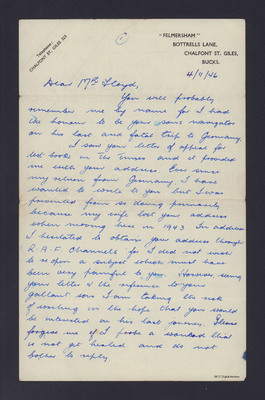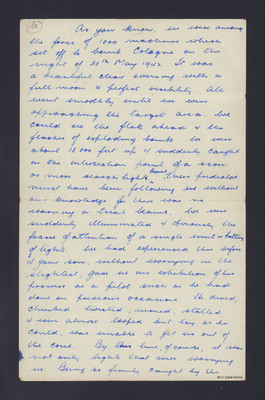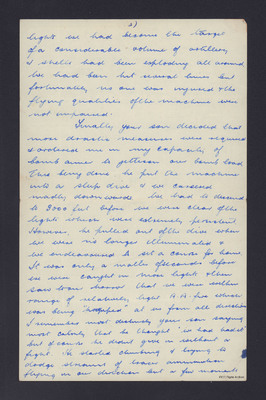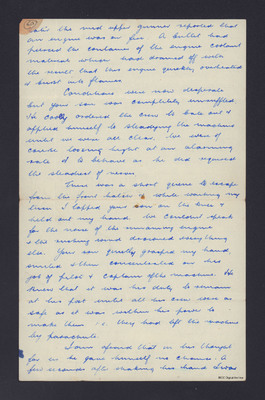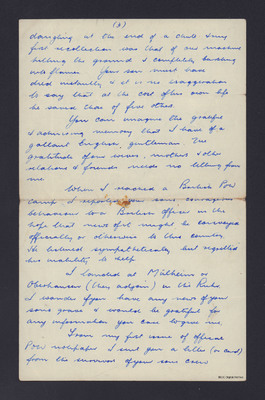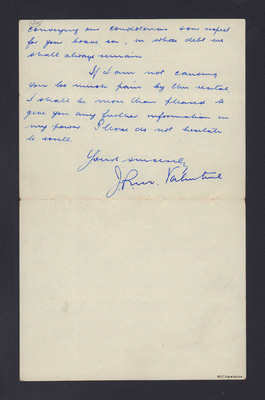Letter from John Valentine to the father of his pilot
Title
Letter from John Valentine to the father of his pilot
Description
To Mr Floyd, father of Philip Floyd, mentioning that he was his son's navigator and that he had recently discovered Mr Loyd's address. Expresses concern that he might upset Mr Floyd. Provides description of their last operation on 1000 bomber attack on Cologne included being illuminated by searchlights despite desperate manoeuvring, jettisoning bombs, diving to low level, being hit by anti aircraft fire setting engine on fire. Continues with crew bailing out but pilot killed as insufficient time to abandon aircraft. Praises pilots flying ability, courage, and sacrifice. Mentions that he had reported pilot's courage while a prisoner of war. Asks if he has any news of his son's grave,
Creator
Date
1946-11-04
Spatial Coverage
Language
Format
Six page handwritten letter
Publisher
Rights
This content is available under a CC BY-NC 4.0 International license (Creative Commons Attribution-NonCommercial 4.0). It has been published ‘as is’ and may contain inaccuracies or culturally inappropriate references that do not necessarily reflect the official policy or position of the University of Lincoln or the International Bomber Command Centre. For more information, visit https://creativecommons.org/licenses/by-nc/4.0/ and https://ibccdigitalarchive.lincoln.ac.uk/omeka/legal.
Identifier
SValentineJRM1251404v20025
Transcription
“Felmersham”
Bottrells Lane,
Chalfont St Giles,
Bucks.
Telephone: Chalfont St Giles 323
4/11/46
Dear Mr Floyd,
You will probably remember me by name for I had the honour to be your sons navigator on his last and fatal trip to Germany.
I saw your letter of appeal for text books in The Times and it provided me with your address. Ever since my return from Germany, I have wanted to write to you but I was prevented from doing so primarily because my wife lost your address when moving here in 1943. In addition I hesitated to obtain your address through R.A.F. channels for I did not wish to re-open a subject which must have been very painful to you. However seeing your letter & the reference to your gallant son I am taking the risk of writing in the hope that you would be interested in his last journey. Please forgive me if I probe a wound that is not yet healed and do not bother to reply.
As you know, we were among the force of 1000 machines which set off to bomb Cologne on the night of 30th May 1942. It was a beautiful clear evening with a full moon & perfect visibility. All went smoothly until we were approaching the target area. We could see the flak ahead & the flashes of the bombs. We were about 13,000ft up & suddenly caught in the intersection point of a score or more searchlight beams. Their predictors must have been following us without our knowledge for there was no warning or trial beams. We were suddenly illuminated & obviously the focus of attention of a single unit or battery of lights. We had experienced this before, and your son, without worrying the slightest gave us an exhibition of his prowess as a pilot such as he had done on previous occasions. He dived, climbed, twisted, turned, stalled, & almost looped but, try as he could, was unable to get us out of the cone. By this time of course, it was not only lights that were worrying us. Being so firmly caught by the
2)
Lights we had become the target of a considerable volume of artillery & shells had been exploding all around. We had been hit several times but fortunately no one was injured & the flying qualities of the machine were not impaired.
Finally your son decided that more drastic measures were required and ordered me in my capacity as bomb aimer to jettison our bomb load. This being done, he put the machine into a steep dive & we careered madly downwards. We had to descend to 3000 feet before we were clear of lights which were extremely persistent. However, he pulled out of his dive when we were no longer illuminated & we endeavoured to set a course for home. It was only a matter seconds before we were caught up in more lights & then saw to our horror that we were within range of relatively light A.A. fire which was being “hosepiped” at us from all directions. I remember most distinctly your son saying most calmly that he thought “we had had it” but of course he didn’t give in without a fight. He started climbing & trying to dodge streams of tracer ammunition flying in our direction but a few moments later the mid upper gunner reported that an engine was on fire. A bullet had pierced the container for the engine coolant material which had drained off with the result that this engine quickly overheated & burst into flames.
Conditions were now desperate but your son was completely unruffled. He coolly ordered the crew to bale out & applied himself to steadying the machine until we were all clear. We were of course loosing height at an alarming rate & to behave as he did required the steadiest of nerves.
There was a short queue to escape from the front hatch & while waiting my turn I tapped your son on the knee & held out my hand. We couldn’t speak for the noise of the running engine & the rushing wind drowned everything else. Your son quietly grasped my hand, smiled & then concentrated on his job of pilot & captain of the machine. He knew that it was his duty to remain at his post until all his crew were as safe as it was within his power to make them i.e. they had left the machine by parachute.
I am afraid that in his [?] for us he gave himself no chance. A few seconds after shaking his hand I was
3)
Dangling at the end of a chute & my first recollection was that of our machine hitting the ground & completely bursting into flames. Your son must have died instantly &it is no exaggeration to say that at the cost of his own life he saved those of five others.
You can imagine the grateful & aching memory that I have of a gallant English gentleman. The gratitude of our wives, mothers & other relations & friends needs no telling from me.
When I reached a British POW camp I reported your sons courageous behaviour to a British officer in the hope that news of it might be conveyed officially or otherwise to this country. He listened sympathetically but regretted his inability to help.
I landed in Mulheim or Oberhausen (they adjoin) in the Ruhr. I wonder if you have any news of your sons grave & would be grateful for any information you care to give me.
From my first issue of official POW notepaper I sent you a letter or (card) from the survivors of your son’s crew. Conveying our condolences & our respect for your brave son, in whose debt we shall always remain.
If I am not causing you too much pain by this recital, I shall be more than pleased to give you any further information in my power. Please do not hesitate to write.
Yours sincerely
J.R.M. Valentine (signed)
Bottrells Lane,
Chalfont St Giles,
Bucks.
Telephone: Chalfont St Giles 323
4/11/46
Dear Mr Floyd,
You will probably remember me by name for I had the honour to be your sons navigator on his last and fatal trip to Germany.
I saw your letter of appeal for text books in The Times and it provided me with your address. Ever since my return from Germany, I have wanted to write to you but I was prevented from doing so primarily because my wife lost your address when moving here in 1943. In addition I hesitated to obtain your address through R.A.F. channels for I did not wish to re-open a subject which must have been very painful to you. However seeing your letter & the reference to your gallant son I am taking the risk of writing in the hope that you would be interested in his last journey. Please forgive me if I probe a wound that is not yet healed and do not bother to reply.
As you know, we were among the force of 1000 machines which set off to bomb Cologne on the night of 30th May 1942. It was a beautiful clear evening with a full moon & perfect visibility. All went smoothly until we were approaching the target area. We could see the flak ahead & the flashes of the bombs. We were about 13,000ft up & suddenly caught in the intersection point of a score or more searchlight beams. Their predictors must have been following us without our knowledge for there was no warning or trial beams. We were suddenly illuminated & obviously the focus of attention of a single unit or battery of lights. We had experienced this before, and your son, without worrying the slightest gave us an exhibition of his prowess as a pilot such as he had done on previous occasions. He dived, climbed, twisted, turned, stalled, & almost looped but, try as he could, was unable to get us out of the cone. By this time of course, it was not only lights that were worrying us. Being so firmly caught by the
2)
Lights we had become the target of a considerable volume of artillery & shells had been exploding all around. We had been hit several times but fortunately no one was injured & the flying qualities of the machine were not impaired.
Finally your son decided that more drastic measures were required and ordered me in my capacity as bomb aimer to jettison our bomb load. This being done, he put the machine into a steep dive & we careered madly downwards. We had to descend to 3000 feet before we were clear of lights which were extremely persistent. However, he pulled out of his dive when we were no longer illuminated & we endeavoured to set a course for home. It was only a matter seconds before we were caught up in more lights & then saw to our horror that we were within range of relatively light A.A. fire which was being “hosepiped” at us from all directions. I remember most distinctly your son saying most calmly that he thought “we had had it” but of course he didn’t give in without a fight. He started climbing & trying to dodge streams of tracer ammunition flying in our direction but a few moments later the mid upper gunner reported that an engine was on fire. A bullet had pierced the container for the engine coolant material which had drained off with the result that this engine quickly overheated & burst into flames.
Conditions were now desperate but your son was completely unruffled. He coolly ordered the crew to bale out & applied himself to steadying the machine until we were all clear. We were of course loosing height at an alarming rate & to behave as he did required the steadiest of nerves.
There was a short queue to escape from the front hatch & while waiting my turn I tapped your son on the knee & held out my hand. We couldn’t speak for the noise of the running engine & the rushing wind drowned everything else. Your son quietly grasped my hand, smiled & then concentrated on his job of pilot & captain of the machine. He knew that it was his duty to remain at his post until all his crew were as safe as it was within his power to make them i.e. they had left the machine by parachute.
I am afraid that in his [?] for us he gave himself no chance. A few seconds after shaking his hand I was
3)
Dangling at the end of a chute & my first recollection was that of our machine hitting the ground & completely bursting into flames. Your son must have died instantly &it is no exaggeration to say that at the cost of his own life he saved those of five others.
You can imagine the grateful & aching memory that I have of a gallant English gentleman. The gratitude of our wives, mothers & other relations & friends needs no telling from me.
When I reached a British POW camp I reported your sons courageous behaviour to a British officer in the hope that news of it might be conveyed officially or otherwise to this country. He listened sympathetically but regretted his inability to help.
I landed in Mulheim or Oberhausen (they adjoin) in the Ruhr. I wonder if you have any news of your sons grave & would be grateful for any information you care to give me.
From my first issue of official POW notepaper I sent you a letter or (card) from the survivors of your son’s crew. Conveying our condolences & our respect for your brave son, in whose debt we shall always remain.
If I am not causing you too much pain by this recital, I shall be more than pleased to give you any further information in my power. Please do not hesitate to write.
Yours sincerely
J.R.M. Valentine (signed)
Collection
Citation
John Ross Mckenzie Valentine, “Letter from John Valentine to the father of his pilot,” IBCC Digital Archive, accessed November 5, 2024, https://ibccdigitalarchive.lincoln.ac.uk/omeka/collections/document/22272.
Item Relations
This item has no relations.

